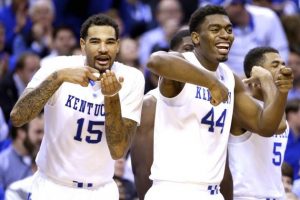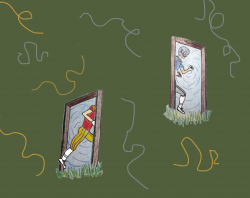When the Philadelphia 76ers selected Markelle Fultz with the first round pick in the 2017 NBA Draft this summer, they did so after the 19-year-old played only one year at the University of Washington. Fultz was a heavily recruited talent coming out of high school, and there was almost no doubt that he would one day play in the NBA. But because of a provision in the NBA’s Collective Bargaining Agreement (CBA), commonly known as the “one-and-done” rule, Fultz was required to wait for at least one year after he graduated from high school before he was eligible for the draft.
This editorial board finds that this provision, which requires athletes to either play in the NCAA or abroad before they can be drafted, ultimately serves to help professional franchises and elite college programs while violating the rights of the players.
Age eligibility in the NBA has been debated since the creation of the league and went before the Supreme Court in 1971. In the landmark Haywood v. National Basketball Association case, the court ruled 7-2 in favor of Spencer Haywood, a player who sued after he was kept out of the league for failing to meet the eligibility requirement of waiting four years after his high school graduation.
After the Haywood decision, more players began to go pro before they completed college, and in some cases, directly out of high school. Between 1995 and 2005, a number of well-known players were drafted directly out of high school, including Kevin Garnett, Kobe Bryant, and LeBron James. This trend ended in 2005, when the league’s CBA was changed to add the “one-and-done” rule.
Proponents of the rule argue that it keeps NBA scouts out of high school gyms and ensures that student-athletes get an education, or at least a part of one, before going pro. Instead, the rule restricts the rights of basketball players and continues many of the shady practices that have defined NCAA athletics for so long.
It seems unreasonable that these athletes aren’t at least given the choice to declare for the NBA draft. After all, if they are skilled enough to play in the league, why should they not be allowed to earn money for their playing? As the debate around NCAA amateurism rises, we find it important that players, at the very least, are not forced into this amateurism. If they choose to play in the NCAA because they think that it’s best for their careers, then that is their prerogative. However, their participation shouldn’t be required. Forcing highly skilled athletes to play for a year without pay risks the chance of a career-altering injury and takes away a year of salary, all in a way that benefits the NBA team owners.
By having the nation’s top talent play in college for a year, NBA teams are able to ensure that their new players are trained and marketed at no cost to them. This year, for example, the owner of the Los Angeles Lakers was able to profit from ticket and jersey sales related to their first-round draft pick, Lonzo Ball, long before the rookie received his first game check. To most NBA owners and front offices, the required year in college means that players are developed by strong coaching and training staffs and can begin to cultivate a fandom all while staying off the NBA’s payroll.
The one-and-done rule also exacerbates a number of problems already entrenched in NCAA basketball. Forcing players to play in college for a year only heightens the idea that student-athletes aren’t going to these universities to learn, but rather are going for the inconvenient pit stop on the way to the NBA. The issue of finding the proper balance between student and athlete is a complicated one, and we aren’t suggesting that the problem would be fixed entirely by ending one-and-done. Still, if college basketball players were in college because they chose to be, even if it’s because they think that is their best chance to play professional basketball, it is hard to imagine that the issue of academics among athletes wouldn’t improve.
Ending the one-and-done rule would also combat the shady recruitment dealings that fans, officials, and coaches have been aware of for almost as long as the sport has existed but that only recently came to light. This year, an FBI investigation concluded with a number of college coaches and apparel executives facing charges for corruption in the recruitment process. Former Louisville Head Coach Rick Pitino was notably involved, and he and the school’s athletic director were forced to resign. In the case of Louisville, money was funneled from Adidas, which sponsors the school’s athletics program, to the families of recruits, in return for committing to the university and signing an endorsement with the company when they left the university the next year. Ending the one-and-done rule will not end corruption in college basketball. Still, by not forcing players into college, the chances for bribery in NCAA basketball decrease.
Contrary to the cries of one-and-done apologists, allowing players into the NBA following high school will not ruin college basketball. Not every player will choose to enter the draft, and college basketball will still provide a valuable opportunity for most players to hone their skills before going pro. Besides, one need not look any further than last year’s national champions, the North Carolina Tar Heels, as an example of a team that can find success with players who stay for three and four years.
Each individual athlete’s situation is different, and there is no one-size-fits-all answer to what should be done when a basketball player graduates high school. That is a decision best left to the athlete and his family. This life choice should be left open, with as few restrictions as possible, particularly restrictions that benefit the teams they’ll soon be playing for at the young athlete’s expense.





